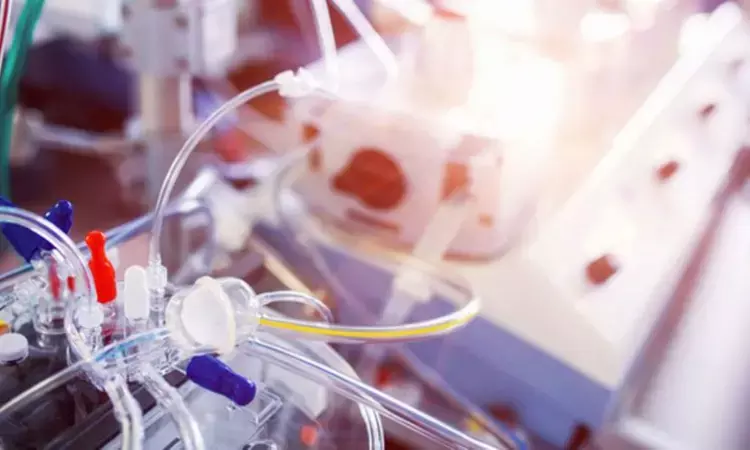- Home
- Medical news & Guidelines
- Anesthesiology
- Cardiology and CTVS
- Critical Care
- Dentistry
- Dermatology
- Diabetes and Endocrinology
- ENT
- Gastroenterology
- Medicine
- Nephrology
- Neurology
- Obstretics-Gynaecology
- Oncology
- Ophthalmology
- Orthopaedics
- Pediatrics-Neonatology
- Psychiatry
- Pulmonology
- Radiology
- Surgery
- Urology
- Laboratory Medicine
- Diet
- Nursing
- Paramedical
- Physiotherapy
- Health news
- Fact Check
- Bone Health Fact Check
- Brain Health Fact Check
- Cancer Related Fact Check
- Child Care Fact Check
- Dental and oral health fact check
- Diabetes and metabolic health fact check
- Diet and Nutrition Fact Check
- Eye and ENT Care Fact Check
- Fitness fact check
- Gut health fact check
- Heart health fact check
- Kidney health fact check
- Medical education fact check
- Men's health fact check
- Respiratory fact check
- Skin and hair care fact check
- Vaccine and Immunization fact check
- Women's health fact check
- AYUSH
- State News
- Andaman and Nicobar Islands
- Andhra Pradesh
- Arunachal Pradesh
- Assam
- Bihar
- Chandigarh
- Chattisgarh
- Dadra and Nagar Haveli
- Daman and Diu
- Delhi
- Goa
- Gujarat
- Haryana
- Himachal Pradesh
- Jammu & Kashmir
- Jharkhand
- Karnataka
- Kerala
- Ladakh
- Lakshadweep
- Madhya Pradesh
- Maharashtra
- Manipur
- Meghalaya
- Mizoram
- Nagaland
- Odisha
- Puducherry
- Punjab
- Rajasthan
- Sikkim
- Tamil Nadu
- Telangana
- Tripura
- Uttar Pradesh
- Uttrakhand
- West Bengal
- Medical Education
- Industry
ECLS in Cardiogenic Shock: New Trial Reveals No Survival Advantage, Highlights Safety Concerns

Germany: Extracorporeal life support (ECLS), a treatment increasingly employed for infarct-related cardiogenic shock, has raised questions about its impact on mortality due to the lack of evidence. A recent multicenter trial published in the New England Journal Of Medicine by Holger Thiele and colleagues aimed to address this uncertainty by investigating the effects of early ECLS in patients with acute myocardial infarction complicated by cardiogenic shock.
The study suggested that for patients with acute myocardial infarction complicated by cardiogenic shock and early planned revascularization, the addition of ECLS therapy did not result in a lower risk of all-cause mortality at the 30-day follow-up compared to those receiving medical therapy alone.
The trial involved 420 patients who were randomly assigned to receive either early ECLS in addition to usual medical treatment (ECLS group) or usual medical treatment alone (control group). The primary outcome measured was all-cause mortality at 30 days. Safety outcomes, including bleeding, stroke, and peripheral vascular complications requiring intervention or surgery, were also assessed.
• After analyzing the data from 417 patients who were included in the final analysis, the results revealed that the rate of death from any cause at the 30-day mark was comparable between the two groups.
• In the ECLS group, 47.8% of patients experienced mortality, while the control group reported a mortality rate of 49.0%.
• The relative risk of death between the two groups was 0.98, with a confidence interval of 0.80 to 1.19, showing no significant difference in outcomes.
• Secondary outcomes highlighted the safety concerns associated with ECLS.
• Patients in the ECLS group demonstrated a higher incidence of moderate or severe bleeding (23.4% vs. 9.6% in the control group) and peripheral vascular complications requiring intervention (11.0% vs. 3.8% in the control group).
Meanwhile, "the best course may be to reserve the early initiation of ECLS for those patients with infarct-related cardiogenic shock in whom the likely benefits more clearly outweigh the potential harms," wrote Jane A. Leopold, MD, of Brigham and Women's Hospital in Boston, and Darren B. Taichman, MD, PhD, of the University of Pennsylvania in Philadelphia
In conclusion, the trial suggested that for patients with acute myocardial infarction complicated by cardiogenic shock and early planned revascularization, the addition of ECLS therapy did not result in a lower risk of all-cause mortality at the 30-day follow-up compared to those receiving medical therapy alone. The findings emphasize the need for further research and consideration of safety concerns when utilizing ECLS in this patient population.
Reference:
New England Journal of Medicine Thiele H, et al "Extracorporeal life support in infarct-related cardiogenic shock" N Engl J Med 2023; DOI: 10.1056/NEJMoa2307227.
Dr Kamal Kant Kohli-MBBS, DTCD- a chest specialist with more than 30 years of practice and a flair for writing clinical articles, Dr Kamal Kant Kohli joined Medical Dialogues as a Chief Editor of Medical News. Besides writing articles, as an editor, he proofreads and verifies all the medical content published on Medical Dialogues including those coming from journals, studies,medical conferences,guidelines etc. Email: drkohli@medicaldialogues.in. Contact no. 011-43720751


